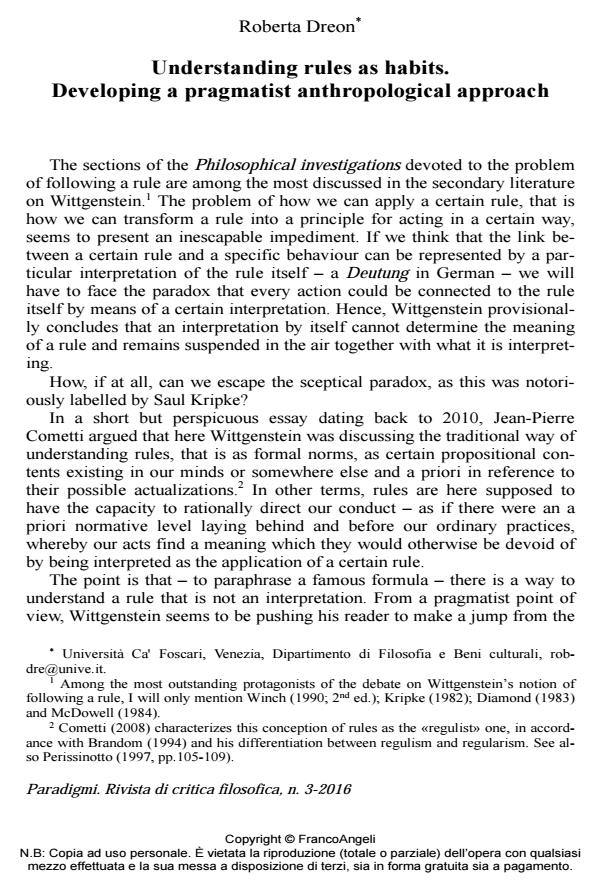Understanding rules as habits. Developing a pragmatist anthropological approach
Journal title PARADIGMI
Author/s Roberta Dreon
Publishing Year 2017 Issue 2016/3
Language English Pages 15 P. 103-117 File size 191 KB
DOI 10.3280/PARA2016-003007
DOI is like a bar code for intellectual property: to have more infomation
click here
Below, you can see the article first page
If you want to buy this article in PDF format, you can do it, following the instructions to buy download credits

FrancoAngeli is member of Publishers International Linking Association, Inc (PILA), a not-for-profit association which run the CrossRef service enabling links to and from online scholarly content.
By taking Wittgenstein’s well-known reflections on following a rule as its starting point, the paper suggests that what the Austrian philosopher meant by rule could better be understood in terms of habits, as these have been theorized by the classical pragmatists – and by John Dewey in particular. This kind of interpretation reinforces both the rejection of the intellectualistic approach to the issue of following rules, and the emphasis on their primarily social dimension. On the other hand, this reading also forces us to clarify what the anthropological consequences might be of Wittgenstein’s leap from the dichotomy between the alleged a priori norms and their alleged empirical actualizations to our already meaningful ordinary practices. Consequently, the paper articulates the basic anthropological assumptions characterizing the pragmatist approach to habits by stressing their natural and social implications. Finally, the author outlines what the consequences might be of this interpretation of rules in terms of habits for the question of normativity.
Keywords: Habits, Rules, Wittgenstein, Dewey, Anthropology
- Andronico M. (1998). Antropologia e metodo morfologico: studio su Wittgenstein. Napoli: La città del sole.
- Bernstein R. (2010). The pragmatic turn. Cambridge: Polity Press.
- Borutti S. (1985). Wittgenstein e l’orizzonte antropologico della regola. Nuova Civiltà Delle Macchine, 3, 3/4: 9-15,
- Bourdieu P. (1972). Esquisse d’une théorie de la pratique précédé de Trois études d’ethnologie kabyle. Paris: Seuil.
- Bourdieu P. (1980). Le sens pratique. Paris: Les Editions de Minuit.
- Brandom R. (1994). Making it explicit. Reasoning, representing, and discursive commitment. Cambridge: Harvard University Press.
- Calcaterra R.M. (2016). Constructing on contingency: William James from biology to ethics and politics. Cognitio, 13,1: 219-231.
- Colapietro V. (2004). Doing – and undoing – the done thing: Dewey and Bourdieu on habituation, agency, and transformation. Contemporary Pragmatism, 1, 2: 65-93, DOI: 10.1163/18758185-90000141
- Cometti J.-P. (2008). Qu’est-ce qu’une règle. Éducation et Didactique, 2, 2: 141-150,
- Dewey J. (1976). Interpretation of savage mind. In: The middle works, 1899-1924, Volume 2: 1902-1903, Carbondale & Edwardsville: Southern Illinois University Press: 39-52.
- Dewey J. (1988a). Human nature and conduct. The middle works, 1899-1924, Volume 14: 1922, Carbondale & Edwardsville: Southern Illinois University Press.
- Dewey J. (1988b). The vanishing subject in the psychology of James. In: The later works, 1925-1953, Volume 14: 1939-1941, Carbondale & Edwardsville: Southern Illinois University Press: 155-167.
- Dewey J. (1989). Art as experience. The later works, 1925-1953, Volume 10: 1934, Carbondale & Edwardsville: Southern Illinois University Press.
- Diamond C. (1983). Wittgenstein on rules and private language. Philosophical Books, 24, 2: 96-98,
- Dreon R (2010). John Dewey: l’abito fa il naturalismo culturale. Bollettino Filosofico, XXVI: 169-182.
- James W. (1981). The principles of psychology. 2 vols., Cambridge: Harvard University Press.
- Kestenbaum V. (1992). Meaning on the model of truth. Dewey and Gadamer on habit and Vorurteil. The Journal of Speculative Psychology. New Series, 6, 1: 25-66.
- Kripke A.S. (1982). On rules and private language. Oxford: Blackwell.
- Leary D.E. (2013). A moralist in an age of scientific analysis and skepticism: habit in the life and work of William James. In: Sparrow T. and Hutchinson A., eds. A history of habit. From Aristotle to Bourdieu. Plymouth: Lexington Books: 177-208.
- MacMullan T. (2013). The fly wheel of society. habit and social meliorism in the pragmatist tradition. In: Sparrow T. and Hutchinson A., eds. A history of habit. From Aristotle to Bourdieu. Plymouth: Lexington Books: 229-253.
- Margolis J. (1999). Relativism and cultural relativity. In: What, after all, is a work of art? Lectures in the philosophy of art. University Park, PA: The Pennsilvania State University Press: 41-66.
- Margolis J. (2002). Reinventing pragmatism. American philosophy at the end of the twentieth century. Ithaca: Cornell University Press.
- McDowell J. (1984). Wittgenstein on following a rule. Synthèse, 58, 3, Essays on Wittgenstein’s later philosophy: 325-363.
- Mead G.H. (2011a), Social psychology as counterpart to physiological psychology. In: Deegan M.J., ed. Essays in social psychology. New Brunswick-London: Transaction Publishers: 9-17.
- Mead G.H. (2011b), The relation of the embryological development to education. In: Deegan M.J., ed. Essays in social psychology. New Brunswick-London: Transaction Publishers: 73-82.
- Mithen S., Parsons L. (2008). The brain as cultural artifact. Cambridge Archeological Journal, 18, 3: 415-422,
- Perissinotto L. (1997). Wittgenstein. Una guida. Milano: Feltrinelli.
- Rofena C. (2011). Wittgenstein e l’errore di Frazer. Etica morfologica ed estetica antropologica. Milano-Udine: Mimesis.
- Shusterman R. (2008). Redeeming somatic reflection: John Dewey’s somatic philosophy of body-mind. In: Body consciousness. A philosophy of mindfuless and somaesthetics. Cambridge: Cambridge University Press: 180-216.
- Sullivan S. (2013). Oppression in the gut. The biological dimensions of Deweyan habit. In: Sparrow T. and Hutchinson A., eds. A history of habit. From Aristotle to Bourdieu. Plymouth: Lexington Books: 255-271.
- Winch P. (1990; 2nd ed.). The idea of a social science and its relation to philosophy. London: Routledge.
- Wittgenstein L. (1953). Philosophical investigations, ed. by G.E.M. Anscombe and R. Rhees, Oxford: Blackwell.
- Affective Scaffoldings as Habits: A Pragmatist Approach Laura Candiotto, Roberta Dreon, in Frontiers in Psychology 629046/2021
DOI: 10.3389/fpsyg.2021.629046
Roberta Dreon, Understanding rules as habits. Developing a pragmatist anthropological approach in "PARADIGMI" 3/2016, pp 103-117, DOI: 10.3280/PARA2016-003007